Disclosure: Some of the links you’ll encounter are affiliate links. If you click and buy something, I’ll get a commission. If you’re reading a review of some precious metals company, please understand that some of the links are affiliate links that help me pay my bills and write about what I love with no extra cost to you. Thank you!
Jump here: SEMrush vs Serpstat in 2023| SEMrush Vs. Serpstat in 2023 – Quick Overview| SEMrush Vs. Serpstat 2023 FAQ| SEMrush vs Serpstat 2023 (Conclusion)|
SEMrush vs Serpstat in 2023…
Bot SEO tools are popular and effective, but which one is truly better for you?
Read my comparison guide to find out.
Let’s go!
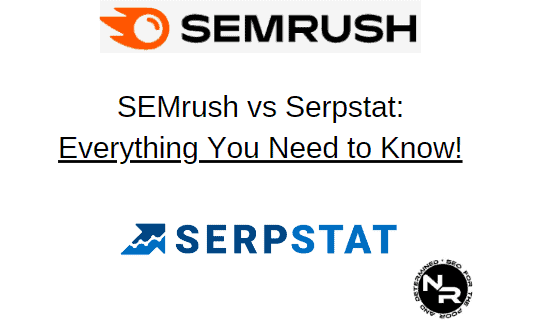
Table of Contents
SEMrush vs Serpstat in 2023: Which SEO Tools Is Worth Your Money?
The best way to learn which SEO tool is worth your money is by understanding both tools on all counts, what they offer, how each feature aligns with your business requirements, and what they are both short of.
Top Features of SEMrush SEO Tool
To grow your digital presence faster, SEMrush sets you up with 55+ tools to boost your efforts in SEO, Content marketing, Social media marketing, and PPC.
Here are some SEMrush features worth paying attention to:
- Uncover profitable yet low-competitive keywords using Keyword Magic Tool;
- Complete Domain analysis;
- Discover traffic and backlink insights of your competition;
- Track organic rankings for your keywords;
- Keep an eye on your link’s profile and weed out bad links;
- Scan your website for technical SEO mistakes and get instructions to fix them;
- Get actionable content briefs as you input the keywords;
- Check your website’s on-page SEO and get optimization ideas;
- PPC Ad campaigns research;
- Grow your brand’s visibility using Social Media Dashboard;
- Build top-notch content with Content Marketing Dashboard.
Top Features of Serpstat SEO Tool:
Serpstat is an intelligent all-in-one SEO tool designed to help marketers and businesses collect, track, and analyze website performance data across search engines.
Significant features of Serpstat are:
- Website audit management;
- Keyword research;
- Competitive analysis;
- Keyword organic rankings tracking;
- Backlinks analysis;
- Content marketing insights;
- Domain analysis;
- PPC advertising management.
Although both the SEO tools hold similar features and benefits, SEMrush is slightly ahead of the curve with features like Social media management and SEO Content Template Brief, providing users with valuable insights into their social media marketing stats.
SEMrush Vs. Serpstat in 2023 – Quick Overview
SEMrush
For over 14 years now, SEMrush has been helping businesses and marketers build and tune up online visibility across various channels, be so search engines, social media, or PPC advertising.
SEMrush collects and processes comprehensive volumes of data daily, providing marketers with insights to boost their brand visibility online.
Although SEMrush started as a small startup in 2008, with just two SEO tools and a small team, now it’s evolved into a robust platform with over 50+ SEO tools, 1000+ employees, and to winning International awards like “European Search Awards” numerous times.
Following are some of the SEMrush statistics worth paying attention to:

Serpstat
Serpstat was founded in 2013 by Oleg Salamaha as a small and developed into one of the most potent SEO platforms, serving 200,000+ brands worldwide, including Udemy, PHILIPS, Uber, Loreal, Samsung, Shopify, etc.
Here are some of the exciting facts about Serpstat:

SEMrush vs Serpstat- User Interface Comparison
Let’s look at the interfaces and how intuitive they are to work on.
SEMrush’s User Interface:
SEMrush offers a clean and comprehensive user interface to keep SEO veterans happy while still managing it to be beginner-friendly. Here’s how it looks:

As you can see in the above picture, you’ve everything you need in one place to learn about a website, right from domain overview and traffic analytics to keyword overview, backlink analysis, and site audits.
Serpstat User Interface:
I loved the simplicity of Serpstat’s SEO dashboard – It is foolproof and reveals in-depth data in just a few clicks. Likewise, you won’t be overwhelmed with the futile features you’ll never use.
As you can see above, Serpstat’s User Interface simply rocks. All the vital features, like website analysis, competitive intelligence, semantics, website audits, rank tracking, contextual advertising, etc., are easily accessible.
So, which tool’s user interface impressed us a lot?
Although the U.I of both SEO tools is outstanding and intuitive, SEMrush’s strategic side management that involves tools – SEO, Local SEO, Advertising, Social media, and Content marketing gives SEMrush a slight edge, in our opinion.
SEMrush vs Serpstat- Backlink Analysis
Quick Heads up: We will input the website – www.mashable.com to both tools in order to evaluate and compare which tool yields comprehensive and accurate backlinks profile data.
Let’s jump into SEMrush’s Backlinks Analytics section.
As we load www.mashable.com into the analytics field, here is what we got:

As you can see, SEMrush’s Backlink Analytics tool helps you analyze your website’s and competitor’s link profiles to spot ample link-building opportunities.
Here’s the backlink data you can fetch using the tool:
- Authority Score – The metric used to measure the overall quality of the domain and its influence on SEO.
- Referring Domains – The number of unique domains with at least one link pointing to the analyzed website.
- Backlinks – Total number of backlinks pointing to the analyzed website.
- Monthly Visits – Total number of monthly users visiting the analyzed domain.
- Keywords – The number of keywords ranking in the top 100 SERPs and generating traffic to the analyzed domain.
- Outbound Domains – The number of outgoing domains from the analyzed root domain. It is recommended to maintain this metric low over Referring Domains.
- Toxicity shows the number of bad backlinks the analyzed root domain has. The lower the score, the better the website is.
As we scroll further down the report and look at the data, we see are:
New and Lost Backlinks: The metric shows the no. of backlinks gained and lost for the analyzed website for the past 6 months.

Top Pages: This comes most handy to you when analyzing the competitor’s website. It shows which pages/posts have garnered the most backlinks.

With SEMrush, you can also sort backlink reports by:
- Link type (do-follow or no-follow);
- Backlink types (text, image);
- TLD distribution (Referring Domains’ TLD);
- Countries sending the most links;
- Referring Domains’ Authority score;
- Categories of referring domains;
- Anchor texts, and so on.
Serpstat Backlink Analysis
Serpstat backlink tool is the most potent backlink tool, with a massive link index that can hold extensive data.
Being able to spy on competitors’ backlink secrets and discovering what content has generated the most backlinks helps you learn how the efforts are paying off and leverage the insights for backlinks growth.
With Serpstat backlink analysis, you can graphically find top referring domains, gained and lost backlinks over a period, new link opportunities, referring domains, backlink types, malicious backlinks, external domains, batch analysis, and more insights.
Take a look at the ‘Overview’ of the Mashable website:
Another great feature is ‘Malicious Sites,’ where you can find if the analyzed website has external links to malicious content. This report is exceptionally vital as sending links to vulnerable sites can negatively impact the SEO rankings and must be immediately fixed.
So what’s my verdict on both tools’ backlinks features?
As for beginners, Serpstat stands with SEMrush. However, for pros, when compared to SEMrush, Serpstat’s limited information on backlinks may turn them away.
SEMrush vs Serpstat- Keyword Research
SEMrush Keyword Research
As we learned, SEMrush holds a comprehensive keyword database in the current market.
The SEMrush keyword research overview fetches the following reports when you input a keyword:
- Monthly volume (Country wise/Worldwide);
- Searcher intent for the keyword;
- CPC of the keyword and Ad History;
- Keyword variations;
- Questions related to the keyword;
- SERP breakdown analysis
For example, let’s see what we get for the keyword rugs online.

Not just that, SEMrush bedazzled you with the following tools:
Keyword Magic is the next level resource to the ‘Overview.’ It provides you with insightful data to leverage and lead the competition.
Here is what SEMrush fetched us after entering the seed keyword:

As you can see, for the keyword ‘rugs online,’ there are about 2625 keyword variations with different search intents, keyword volume, keyword difficulty, and much more.
There are a few filters that you can set to generate more specific results from the analyzed keyword.

- Broad Match filter is the default report you see for a keyword. It pulls vast keyword data related to the seed keyword.
- Phrase Match filter shows you the keyword in the same form as the analyzed keyword but in various forms. It excludes variations like – ing, -ed, -s, etc.).
- Exact Match filter narrows down the results that match the analyzed keyword precisely. For example, the price of rugs online, the designs of rugs online, etc.
You can modify the results using the ‘Questions.; Do note that Question-based keywords can significantly help you build a content strategy and improve your search presence when presented with top-notch content.
The success of your online business is determined by targeting the right keywords and the improvement you find. So SEMrush keyword research has everything you need to take your keyword research tactic to incredible levels.
Serpstat Keyword Research
Serpstat position itself as a robust Keyword repository tool with over 4 Billion suggestions and 6.5 Billion keywords in its databases.
To start with Serpstat’s keyword tool, simply enter the seed keyword in the search bar and choose your select engine.
For example, we input the keyword ‘Learn SEO‘ and select ‘Google’ as our search engine and hit. Here is the report we got:
Let us do the breakdown of the above report:
- Search Volume: The number of times a user search for the analyzed keyword in a month.
- Competition: It is the metric to measure the competition level for the keyword on a scale of 0 to 100. The more it is, the higher the competition.
- CPC: Cost Per Click is a metric to learn how much ad agencies like Adsense charge the advertiser per click.
- Keyword Difficulty: An SEO metric that tells how hard your efforts should be to rank for the analyzed keyword on a scale of 0-100. The higher the number, the harder to rank.
As you scroll down, you can also check out reports like Related keywords, Search questions, and various keyword suggestions.
Serpstat PPC Research Tool
First, enter the seed keyword in the search bar, select your PPC platform (like Google, Facebook, Twitter, Instagram, etc.), and hit.

The report will show you the insights and data related to the paid keyword analyzed. Such as:
- Competitors’ advert copy;
- Keyword;
- Ads by Keyword;
- No. of Landing pages designed, etc.
With Serpstat’s Rank Tracker (also known as Competitors Report) in the PPC tool, you can also track the competitors’ SERPs, which helps you analyze the performance and tweak your PPC campaign if necessary.

So who is the winner?
We loved SEMrush as it offers better and more accurate PPC data and has more keyword filters than Serpstat. Especially the Keyword Overview with a bulk search of up to 100 keywords.
However, we couldn’t resist appreciating the User Interface of Serpstat, which is simple and beginner-friendly.
SEMrush Vs Serpstat: Website Auditing
With the power to probe over 150+ technical issues, SEMrush’s site audit tool can incredibly improve the performance of your website.
To get started, you must add the new project by giving your website’s URL. Depending on your site’s size, it may take 2 to 10 minutes to let the tool crawl and audit your website. Once completed, you will be able to discover vital errors, warnings, and notices along with your website’s health. Here’s an example of how it looks:
The most vital checks SEMrush does are:
Crawlability: SEO starts from here; your website needs to be crawlable in order to present a clean user experience to readers and search engines to pick it up. So SEMrush covers about 25 of the most usual issues related to the website structure.
HTTPS Implementation: This report will help you understand HTTPS-related issues of your website on levels like Security, Website architecture, and Server. For example, an SSL certificate expiry information, website pages pointing to the HTTP pages, HSTS, and other security-related information.
Site Performance: Performace-related site check will audit for issues like Page load speed of each page and significant Javascript and CSS. You can also connect your Google Analytics to evaluate page speed more effectively.
Internal Linking: The report helps you learn internal link issues of the analyzed website, such as broken internal and external links, malformed links, too many on-page links, orphan pages, and Page Rank Distribution.
Core Web Vitals: This goes beyond the Site Performance’s report. With it, you will learn the user experience health of your website’s pages up to 10 and get recommendations to help optimize your site for core web vitals.
Serpstat Site Audit
Serpstat’s site audit tool points out your website’s technical SEO problems and gives the fixes, just like SEMrush.
Here’s what Serpstat’s site audit looks like:
As you can see, Serpstat’s site audit is pretty cool and comprehensive. The SDO (Serpstat Domain Optimization) rating tells how well the analyzed website is optimized for SEO on a scale of 0-100. The higher the score, the better.
The tool segments SEO issues into three groups depending on the seriousness: High, medium, and low.

Overall, Serpstat’s site audit tool reveals the website’s vital technical errors related to meta tags, schema markup, redirects, internal links, external links, HTTPS, Page speed, Javascript and CSS, font readability, heading tags, Content, Image optimization, Server parameters, AMP, Markup, hreflang attributes and many more.
When done correctly, the tool can improve your website’s presence by helping you fix the major technical issues your website.
So which Site audit tool is our favorite?
While Serpstat and SEMrush hold and serve all the major features related to site audit and help you gain an edge into the website’s performance, we think SEMrush has a slightly better dashboard and graphical representation.
SEMrush Vs. Serpstat- Pricing
SEMrush Pricing
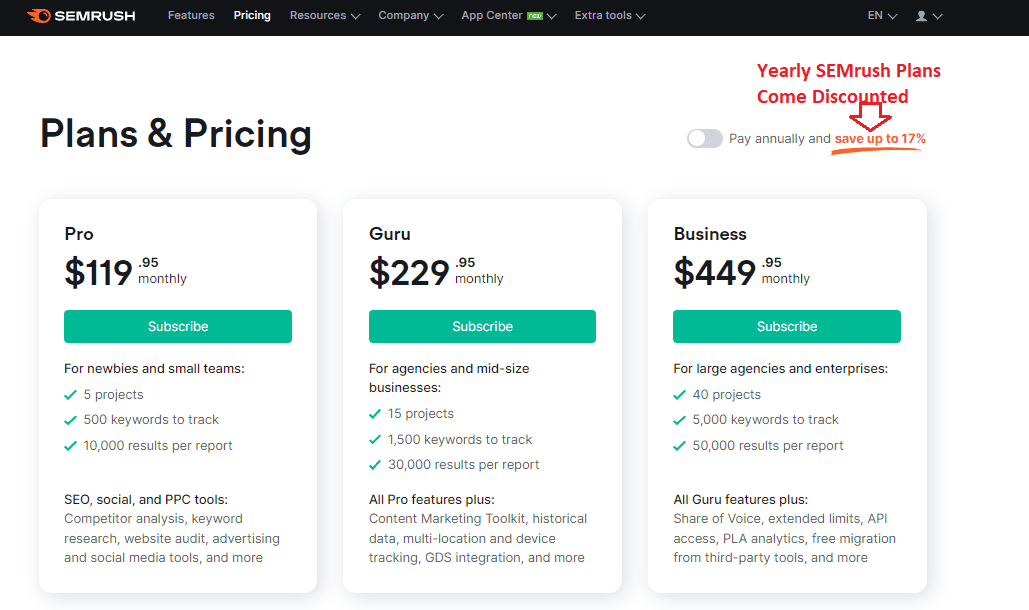
Depending on your website level, the features you need, the number of users, and the extra add-ons you want, there are a variety of monthly and yearly subscriptions you can pick from. Here are they:
- Pro
- Guru
- Business
Let’s talk in detail.
1. Pro plan is SEMrush’s primary and the most affordable plan; that costs you $119.95 monthly. This plan tracks up to 500 keywords, pulls up to 10,000 reports related to keywords, backlinks, and domain, create up to 5 projects, and can crawl up to 100,000 pages. You can add an additional user to access by paying $45 when required.
Overall, the Pro plan is a perfect choice for bloggers and small teams.
2. Guru Plan costs $229.95 monthly. It allows you to create up to 15 projects and track 1500 keywords with daily updates, fetch 30,000 reports, crawl up to 300,000 pages, access Content Marketing Toolkit and monitor up to 50 social media profiles for each project simultaneously. You can add an additional user at $80.
The Guru plan is an excellent option for growing and mid-sized businesses.
3. The Business Plan comes at $449.95 per month. Additional to the Pro and Guru’s features, you will have access to API, PLA analytics, free migration from 3rd party tools and extended limits for reports, and crawl and no. of projects. One exclusive feature of this plan is the product listing ad research tool, which gives you incredible metrics of your competitor ads. An additional user costs $100.
The Business plan is an excellent choice for large-scale enterprises and agencies.
SEMrush offers a 14-day free trial for any plan so you can learn the tool before paying big. Also, if you can’t find the plan that covers all features you want, you can get a custom quote.
Serpstat Pricing
Just like SEMrush, Serpstat is also freemium, which means you can jump in with the free trial and give it a go if you like it.
Let’s look at the 4 pricing plans of Serpstat and see what plan and features meet your budget and requirements.
- Lite
- Standard
- Advanced
- Enterprise
1. The “Lite” plan comes at $48 monthly. It is the lowest and hard-to-beat price for an all-in-one SEO tool like Serpstat. With this plan, one user can do up to 4,000 searches related to keywords, domains and backlinks, pull up to 10,000 results per website report, add up to 10 projects, audit 150,000 pages, have free API access, and up to 15,000 organic position checks.
2. The “Standard” plan costs you $104 monthly, an ideal solution for growing agencies and businesses. The plan includes all Lite features plus – 3 users, extended limits and a user interface. You can fetch 30,000 results per website report, do 5,000 searches for domains, keywords and links, add 50 site audits, do up to 60,000 organic position checks, and access user-branded reports.
3. The “Advanced” plan comes at $209 monthly, a bang for the buck plan for big agencies and teams. Along with the “Standard” features, the plan offers 8,000 credits for domains, keywords and link analysis searches, fetching up to 50,000 results per report, extended API credits and interface, 75 site audits and 1,250,000 pages per audit, and up to 150,000 position checks with daily updates with additional to phone support.
4. The “Enterprise” is the final plan from Serpstat that costs you $349 monthly. The plan supports 7 Users, all “Advanced” features, extended limits, reports, site and interface for websites, keywords and backlinks analysis. The exclusive feature of the plan is the “Whitelabel reporting,” where you can download the reports without Serpstat’s branding, a handy feature for agencies or resellers.
Which tool is affordable and bang for the buck? SEMrush or Serpstat?
Well, it depends. Picking a perfect plan boils down to the features you want for your website or clients and the budget you got.
Serpstat has a more flexible and affordable pricing structure than SEMrush. However, with limited features compared to SEMrush.
For access to PLA analytics, Google Data Studio (GDS) integration, multi-location and device tracking of historical data, and a Content marketing toolkit, SEMrush has a slight feature-rich curve and well-organized insights.
So it’s a no-brainer. If you have the budget and need the extra features SEMrush has, then SEMrush should be your ultimate choice.
On the other hand, If you run a niche business or a blog on a budget, Serpstat can do just fine and is a must-give-it-a-shot tool in the highly competitive market.
SEMrush vs Serpstat – Pros and Cons
As with all SEO tools, SEMrush and Serpstat each have their own pros and cons. It is crucial to look at features, the value of insights they offer, plan that fits your needs, and decide which tool can be the game-changer for your business.
SEMrush Pros and Cons
Pros of using SEMrush:
- Graphs and data visualizations make it easy to understand the insights.
- The website and backlinks audit process are easy to run, and getting instructions to make concrete improvements is spot on.
- The keyword intent data incredibly helps you create right content.
- In addition to search data, PPC data is accurate and provide a competitive edge.
- SEO Writing Assistant ensures your content is well-optimized for humans and SEO.
- The chrome extension and auto-schedule for your social media accounts ensure a brand reputation and a social media presence.
- Competitive analysis is top-notch; Digging up competitors’ traffic, backlinks, keyword analytics, and PR monitoring (including PR backlinks) helps you uncover growth secrets.
- On-page SEO tool helps fix technical errors and improve your chance to rank well in search engines.
- Organic position tracking keeps you busy doing better.
Cons of using SEMrush:
- The monthly cost is extremely high. It can be reduced by keeping the startups and bloggers in mind.
- You need to pay for add-ons like local SEO listing and trends. It can be offered for free.
- The “Keyword Difficulty” data is not accurate as we find.
- You can be overwhelmed with the dashboard and options. I wouldn’t say it is hard to use. It’s just that the U.I is cluttered.
- One-device login at a time is a turn-off.
- Limited functionality in a free trial version.
Serpstat Pros and Cons
Pros of using Serpstat
- Comprehensive tool got all key features
- Easy-to-use interface
- Incredibly cheaper than SEMrush – Gets even cheap when opted 5-year plan
- Tracking Social mentions and their impact on SEO
- Integrates with non-U.S-based search engines
- Whitelabel reporting system – perfect for agencies
- For agencies, the tool allows Multi-domain support
- API for all plans
- Chrome, Mozilla and Opera extensions – Great for quick SEO analysis of the websites you visit
- 1-on-1 product training online/offline
- Full functionality in the free trial
- Multi-channel customer support, including Chat
Cons of using Serpstat:
- Some of the audit explanations are too complex and require the simplest explanation.
- A little to null data on many long-tail keywords
- The backlink analysis tool returns a little of the data compared to SEMrush
- PPC stats and the Ad preview tool often show inaccurate data
- Keyword database is less compared to SEMrush
SEMrush Vs. Serpstat 2023 FAQ- All Your Questions Answered!
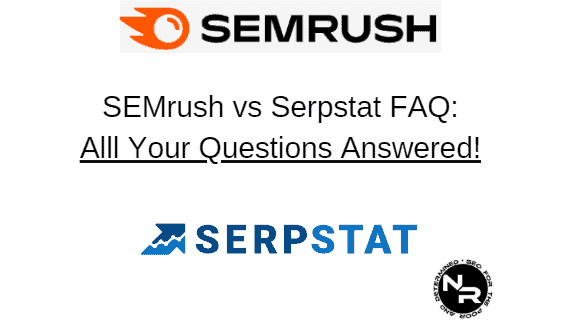
My SEMrush vs Serpstat guide would be incomplete without a thorough FAQ section, agree?
#1- Does Serpstat Offer a Free Trial? What About SEMrush Free Trial?
Serpstat offers a 7-day free trial of Serpstat Lite and Serpstat Standard plans.
SEMrush offers a 14-day free trial of SEMrush Pro and Semrush Guru plans. You can activate the free trial by clicking on this link, or you can learn about SEMrush free trial by reading my guide next.
#2- Will I Need a Credit Card to Activate Serpstat Free Trial? What About With SEMrush’s Free Trial?
You will not need a credit card to activate Serpstat free trial. You will need a credit card to activate SEMrush’s free trial.
#3- Does Serpstat Offer a Lifetime Deal of their Services? What About SEMrush?
Serpstat offers a lifetime deal of their services. You can take advantage of the lifetime deal by buying a yearly Serpstat plan instead of monthly. Click here to learn how much you can save. JUMP LINK
SEMrush also offers a lifetime deal of their services. You can take advantage of the lifetime deal by buying a yearly Serpstat plan instead of monthly one. Click here to learn how much you can save. JUMP link
#4- Does Serpstat Offer a Refund Guarantee of their Services? What About SEMrush Refunds?
Officially Serpstat doesn’t offer a refund guarantee.
However, according to them (view here- https://serpstat.com/page/license-agreement/):
“SERPSTAT is always responsive and reserves the right to consider individual refund requests if they are justified. To do this, you need to send a notification to the address: support@serpstat.com.”
#5- Does Serpstat Offer a Coupon Code? What About SEMrush Promo Codes?
Serpstat doesn’t have an official coupon code you can use on checkout to get a discount. However, there are ways to get Serpstat cheaper.
First, by taking advantage of their yearly pricing you can save up to 20% off the fu price.
Second, you can get a 30% discount o Serptat if you join their affiliate program.
Third, you can get free access to all Serpstat features as a student or a teacher, for the lifetime of your studies.
#6- Is There a Cracked Version of Serpstat? What About SEMrush Cracked?
#7- Can I Get Serpstat via Group Buy Groups? What About SEMrush Group Buy?
You shouldn’t be getting Serpstat via group buy groups. Serpstat group buy is a short-lived option for getting a premium Serpstat plan. If you try it you’ll see your Serptat account getting banned very quickly and your email getting flagged.
SEMrush group buy is also a bad way of getting one of the SEMrush paid plans.
#8- Can I Get Serpstat via Serpstat Premium Cookies? What About SEMrush Cookies?
Serpstat premium cookies method doesn’t work and you can’t get a paid Serptat plan that way.
SEMrush premium cookies are also not a legit way to get SEMrush.
#9- Does Serpstat Have an Affiliate Program I Can Join? What about SEMrush?
Serpstat have an affiliate program you can join. Semrush also have an affiliate program you can join to promote SEMrush.
#10- Does Serpstat Have a Chrome Extension I Can use? What About SEMrush?
Both Serpstat and SEMrush have SEO extensions you can use with all popular browsers.
Download them here:
- https://serpstat.com/extension/
- https://www.seoquake.com/index.html
Read my SEOquake tutorial next to learn how to use this SEO extension to the fullest.
#11- Do Serpstat and SEMrush use the Same Bot to Crawl the Web?
Serpstat and SEMrush don’t use the same bot to crawl the web. Serpstat uses the Serpstat bot, and SEMrush uses the SEMrush bot.
SEMrush vs Serpstat FAQ- All Your Questions Answered! Click To TweetSEMrush vs Serpstat 2023 (Conclusion)
Nikola Roza
Nikola Roza is a blogger behind Nikola Roza- SEO for the Poor and Determined. He writes for bloggers who don't have huge marketing budget but still want to succeed. Nikola is passionate about precious metals IRAs and how to invest in gold and silver for a safer financial future. Learn about Nikola here.

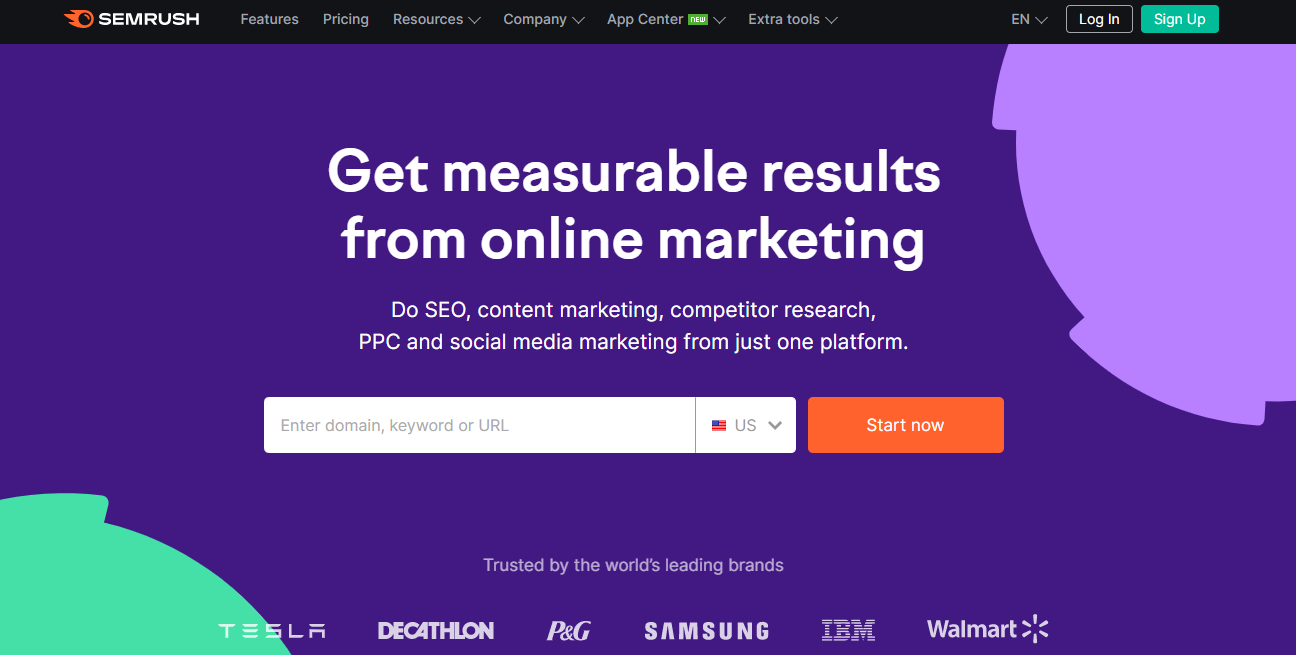
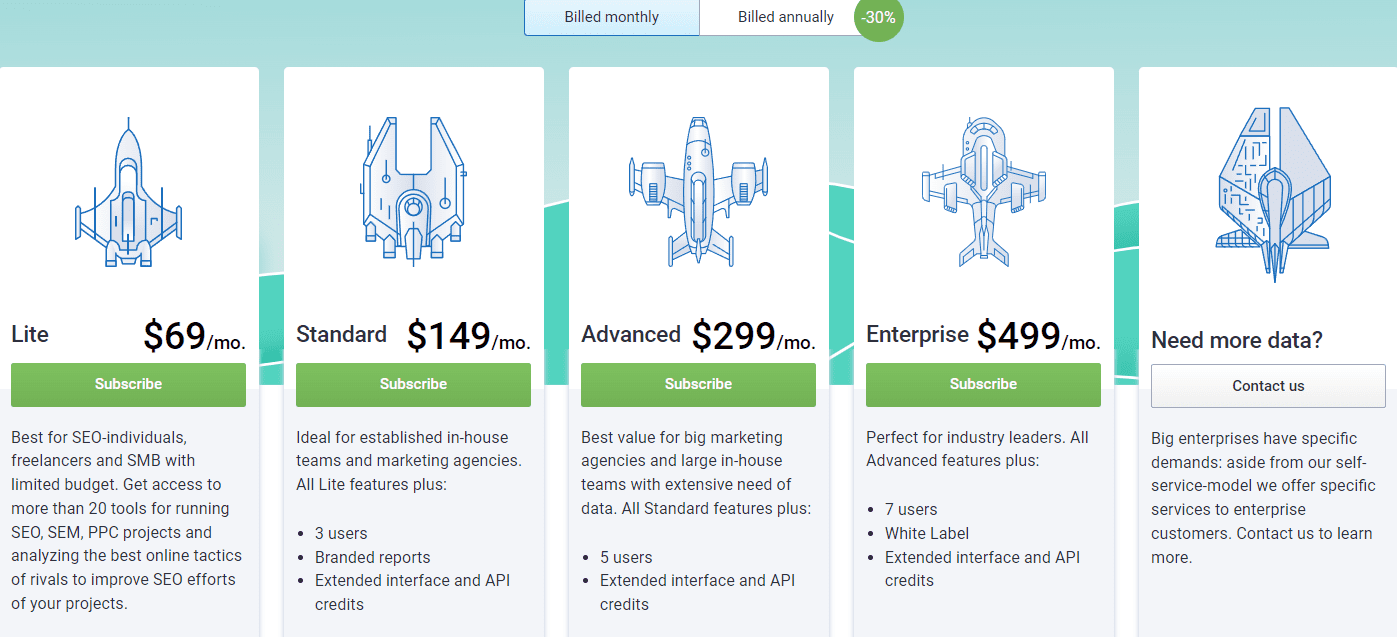

Hi Nikola, I have had the free version of SEMRush for years and love it. I haven’t tried Serpstat but after reading all the extras you get with SEMRush I think that is the best one also. I hope to upgrade in the coming year to their paid plan. Thanks for sharing about these two fabulous tools.
Hi Lisa,
yes, SEMrush is the best SEO tool and platform on the market. It’s also the most expensive (though worth the price). Serpstat is a worthy contender to SEMrush in many areas and is a better choice for people who can’t afford SEMrush, but still need a pro SEO tool.